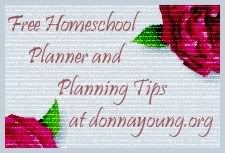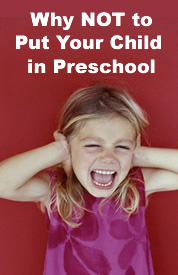Preschool Curriculum
Do preschoolers need really need “curriculum”? Nowadays, many parents answer, “Definitely, yes.” I say it depends on what your definition of “curriculum” is.
Many parents think of “curriculum” as textbooks or some type of pre-written “plan” that shows parents how to teach their children. The purpose of most curriculums is to teach academics (reading, writing, and arithmetic).
My definition of curriculum is different. “Curriculum” includes anything and everything we use to help our children learn. This includes things like literature, games, field trips, your daily routine, art supplies, music, reading aloud, real life experiences, etc, etc.
Preschoolers do need curriculum—just not the type of curriculum most parents have in mind. A good “curriculum” for preschooler’s should include:
-A simple, daily routine
-Ample time for play
-Music, finger plays, and rhythmic activities
-Art activities
-Lots of time being read to
-Real life experiences: Time in nature; “field trips” to the airport, grocery store, pet store, zoo, etc.
It should NOT include an emphasis on “getting ready for Kindergarten” OR learning preschool “facts” (academics).
Q: What curriculum did your family use for your preschoolers?
A: We didn’t. No “workbooks”, no flashcards. No “boxed” curriculum. I don’t think they are necessary. This is what we did instead:
We lived the 4 R’s. We established a simple, daily routine heavy on play, music, art, and reading aloud. We turned our reading aloud time into “themes” or simple “unit studies” by embellishing them with simple experiences whenever we could—things like “field trips”, music, art, cooking experiences, or games.
We watched our children carefully for signs of interest or spontaneous learning. This helped us be sure we were not pushing our children into skills that they weren’t ready for, nor holding them back from skills that they were ready to learn. Once we observed our children’s interest or spontaneous/natural learning in an academic area (alphabet, numbers) we began short, game-like “lessons” that were continued only as long as their interest and enthusiasm remained. When one of our children showed an interest in learning about trains, insects, whales or gardening, we’d head to the library and gather up all the books we could find on the topic, and learn about it together. (I show you how to do all this in my book.)
Q: What curriculum do you recommend for preschoolers?
A: As I have already stated, I don’t believe you need a “curriculum” for the preschool years–especially not an academically based curriculum. If you really feel you need a “guidebook” to help you along (besides my book!), there are only a few suggestions that I can wholeheartedly give:
Before Five in a Row or Five In A Row
All preschoolers can benefit from the developmentally appropriate activities in Dr. Beechick’s Language and Thinking For Young Children
These are all literature-based–books are the center of learning. Your children will learn and grow a base of knowledge about the world, without the usual emphasis on formal academics (seatwork.)
© 2010 Susan Lemons all rights reserved.






12 Helpful Resources for Preschool at Home « Starlight Ink said
[…] A reader asked me to add her blog to my list of resources for preschoolers. I checked it out, and Homepreschool and Beyond looks like it’s packed with helpful ideas from author and child development expert Susan […]
kathleen flanagan said
hi i am using your definition as a reference in my studies could you please email me what book this is written in or what article it is written as i want to put the details in my bibliography,
thanking you,
kathleen
homeschoolmentormom said
Just site the article and link, although the idea comes from my book–I just took liberty with it and re-worded it a bit. My book is Homepreschool and Beyond: A Comprehensive Guide to Early Home Education, by Susan Lemons. Liberty Books is the publisher, 2010.
Kimberly Warner said
I am still trying to deside if I want to homeschool our boys or not. The more I think of the school system here where we live the more I think home schooling would be the best but I have no idea where to start. I feel so over welmed and think that maybe they should just go to the public school for kindergarden or through the 3rd grade but then I come back to the same things on our schools and want to try home schooling. My husband doesn’t think I am making the best choose about home schooling so that is also making me wonder if I can even start something like this. One of our boys is supose to inroll into Pre K in February so he would start next year. I need to here from other Home school parents and tell me how they deal with socializing with other kids his on age. We live out in the country so there is not any other kids around for them to play with.
homeschoolmentormom said
There’s no need to be overwhelmed; homepreschool doesn’t have to be hard—it should be fun! I bet you’re already doing a lot of the things I recommend. We did Homepreschool with all our 4 kids, and those years are some of my favorite memories.
If you want to homepreschool from a Christian perspective, I think my book would be a big help to you. In the meantime, I’d start with a simple daily routine that includes Bible story time, story time, music/finger plays, art, and lots and lots of play time.
As to socialization: Most of the time, socialization is vastly over-rated. Socialization is really all about learning to be around other people—so for little children, that means learning good manners, learning respect for others, learning self-control, learning how to carry on a conversation with others, and so on. Those things are easily and best taught at home. The truth is, preschoolers aren’t very good at socializing each other. Very often, putting little ones into a group with lots of other preschoolers to be “socialized” doesn’t work out the way we’d expect…a cruel pecking order is often the result, and instead of helping each other to be “better”, most preschoolers simply pick up bad habits, words, and attitudes from the other children. The company of sibliings, parents, and other caring adults is best. We can socialize our own children! For a little bit of social exposure (and for friends and support), look up your closest homeschool support group. Most are open to parents of preschoolers, and they should offer park play days, field trips (many of which are appropriate for preschoolers), meetings for just parents, and so on. Many offer co-op classes (art, music, etc), PE, and more. To find your local support group, just google the name of the closest city and “Christian homeschool support group” OR let me know which state you are in and I’ll hook you up with your statewide group so they can find the closest local group for you. Joining a support group now will also give you and your husband to see that you are not doing this alone or unsupported, and you will be able to glean ideas about homeschool curriculum and methods, as well.
To learn more about the socialization issue, please check out the articles listed on my right sidebar under “socialization”.
Here are my suggestions for you: Start by reading the tabs on my blog, and then read the archives on “making the decision to homeschool/Homepreschool.” (Perhaps you could read them to your husband, and discuss them together.) Next, read these helpful articles: Help! I’m afraid to homeschool, https://susanlemons.wordpress.com/2010/07/10/help-im-afraid-to-homeschool/ , How to Start Homepreschooling in Six Simple Steps https://susanlemons.wordpress.com/2010/03/25/how-to-start-homepreschooling-homeschool-preschool-in-six-simple-steps/ , and Preschool at Home: You Can Do It! https://susanlemons.wordpress.com/2010/02/26/preschool-at-home-you-can-do-it/ .
If you are considering homeschooling your kids later, it really is best to start them at home when they are little. That way, they don’t pick up bad habits, discipline issues, or thought patterns from other kids, and they will always think of you as their “teacher” (“they won’t be saying, “but my teacher didn’t do it that way,” etc.) The early years are also crucial for your relationship with your children, AND your kids relationships with each other. Sibling bonding is so important! Let them be best friends! The early years are also crucial for developing your children’s love of learning.
As you go though this process, it is very important to involve your husband. Pray together over it; ask the Lord where HE wants your kids to go to school (and ask yourselves, what is best for your kids spiritually and morally?) Read any helpful information you find to your husband, as well. My husband wasn’t too sure about homeschooling at first, either. He gave me a year to see if I’d stick with it and if it worked for us–and we’ve been homeschooling ever since! Ask your husband for one year. Even if he doesn’t want you to homeschool, the more time preschoolers spend at home, the better. You really can’t mess up preschool or Kindergarten.
If you have any more questions, feel free to let me know!
Marjorie R. Nelsen said
Hi Susan,
I was wandering around your website a few weeks ago and was delighted to see your recommendation for my book, Peak with Books. Somewhere you made the comment that you regretted no nonfiction books were included in Peak. Perhaps you didn’t have a copy in front of you, but I’m happy to say 30 of the 42 lessons include nonfiction books. I totally agree with you on the importance and magic of nonfiction learning!
Also, the featured full-color Inquiry Approach to Learning is an eight page lesson on a Nonfiction/Informative book, The Birth of a Whale. The children’s art work and how-tos of research are an extraordinary example of learning with nonfiction. We included also Cynthia Rylant’s masterful nonfiction book The Whales, and Bruce McMillan’s photo essay Going on a Whale Watch, and more. The research, multiple “ways of knowing,” and beautiful art expressions are among the finest in Peak with Books. I know you’ll enjoy! Thanks for your outstanding support of literature-based learning, as opposed to television. Marjorie R. Nelsen, author of Peak with Books.
Marjorie R. Nelsen said
Oops! This is Marjorie again, Susan. I neglected to say although Peak with Books has many activities adaptable to preschoolers, much of the book is well-suited to kdg/1st grade. The Inquiry nonfiction lesson referred to in the preceding post involved kindergarten children. M. Nelsen